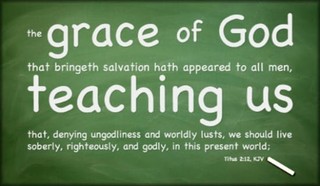- Recent Translations
- All Translations
Titus 2:13
Share
Settings
Titus 2:13 in Other Translations
Titus 2:13 Meaning and Commentary
Looking for that blessed hope
Not the grace of hope; though that being a good hope through grace, and a hope of blessedness, may be called a blessed hope; yet this the saints have already implanted in their hearts in regeneration, and cannot be said to look for it: rather Christ, the object and ground of hope, who is our hope, and Christ in us the hope of glory, who is blessed for evermore; and in the enjoyment of whom the happiness of the saints hereafter will greatly consist; and whom they look for, and expect from heaven, and who is expressly mentioned in the next clause: but as this may be something distinct from that, it may be best, by this blessed hope, to understand the thing hoped for, eternal glory and happiness; called elsewhere the hope of righteousness, and the hope laid up in heaven, ( Galatians 5:5 ) ( Colossians 1:5 ) and which will lie in the beatific vision of God and Christ; in a perfect knowledge of them, in communion with them, and conformity to them; and in the society of angels and glorified saints; and in a freedom from all evil, outward and inward, and in the possession of all good: and to be looking for this, is to be desiring it with the heart and affections set upon it, longing to be in the enjoyment of it, and yet waiting patiently in the exercise of faith and hope; for looking includes all the three graces, faith, hope, and love; and particularly the former, which is always attended with the latter; for it is such a looking for this blessedness, as that a man firmly believes he shall partake of it: and there is good reason for a regenerate man so to look for it; since it is his Father's gift of free grace, and is laid up for him; Christ is gone to prepare it by his presence, mediation, and intercession; yea, he is gone, as the forerunner, to take possession of it in his name: this man is begotten again to a lively hope of it; he is called by the grace of God unto it; he is a child of God, and so an heir of it; he has a right unto it, through the justifying righteousness of Christ, and has a meetness for it through the sanctifying grace of the Spirit; and who is in him as the earnest and pledge of it: now such a firm expectation of the heavenly glory does the Gospel, the doctrine of the grace of God, teach, direct, and encourage to; for these words must be read in connection with the preceding, as a further instruction of the Gospel, as well as what follows:
and the glorious appearing of the great God, and our Saviour Jesus
Christ;
not two divine persons, only one, are here intended; for the word: rendered "appearing", is never used of God the Father, only of the second person; and the propositive article is not set before the word "Saviour", as it would, if two distinct persons were designed; and the copulative "and" is exegetical, and may he rendered thus, "and the glorious appearing of the great God, even our Saviour Jesus Christ"; who, in the next verse, is said to give himself for the redemption of his people: so that here is a very illustrious proof of the true and proper deity of Christ, who will appear at his second coming; for of that appearance are the, words to be understood, as the great God, in all the glories and perfections of his divine nature; as well as a Saviour, which is mentioned to show that he will appear to the salvation of his people, which he will then put them in the full possession of; and that the brightness of his divine Majesty will not make them afraid: and this appearance will be a glorious one; for Christ will come in his own glory, in the glory of his deity, particularly his omniscience and omnipotence will be very conspicuous; and in his glory as Mediator, which will be beheld by all the saints; and in his glory as a Judge, invested with power and authority from his Father, which will be terrible to sinners; and in the glory of his human nature, with which it is now crowned; and in his Father's glory, in the same he had with him before the world was, and which is the same with his, and in that which he will receive from him as man and Mediator, and as the Judge of the whole earth; and in the glory of his holy angels, being attended with all his mighty ones: to which may be added, that saints will be raised from the dead, and with the living ones appear with Christ in glory, and make up the bride, the Lamb's wife, having the glory of God upon her; so that this will be a grand appearance indeed. Now this the Gospel directs, and instructs believers to look for, to love, to hasten to, most earnestly desire, and yet patiently wait for, most firmly believing that it will be: and this the saints have reason to look for, with longing desire and affection, and with pleasure, since it will be not only glorious in itself, but advantageous to them; they will then be glorified with Christ, and be for ever with him.



